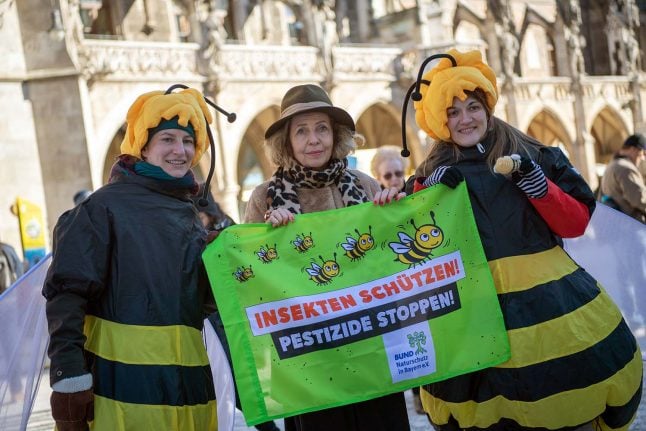“We human beings need insects, they deserve to be protected with their own law,” Environment Minister Svenja Schulze told weekly Bild am Sonntag.
Her “action plan for protecting insects”, seen by news agency DPA, would provide annual funding of €100 million for the cause, including €25 million for research.
Germany would also stop covering new land with concrete for roads or home construction until 2050, and limit light emissions at night to avoid disorienting the six-legged creatures.
The federal government would set rules for “environmentally and naturally bearable application of pesticides and significant reduction of their input and that of other harmful substances into insect habitats,” according to the document.
Saving the bees
The plan comes at the heels of a historic victory in Bavaria. Last Thursday, a record 1.75 million people in the prosperous south German state of Bavaria signed a petition for a referendum to “save the bees”, calling for more organic farming and green spaces and increased protection from agricultural chemicals.
SEE ALSO: Bavaria celebrates most successful referendum ever – to save its bees
The referendum campaign was opposed by the powerful regional farmers' association, which warned of potential financial costs to the industry and urged the population to “stop bashing farmers”
According to the Max Planck Institute, insect populations across Germany have been in free fall in recent years. The number of flying insects in Germany is just one quarter of it was in 1989, while 39 percent of butterfly species have vanished during the past two centuries.
'Protecting ourselves'
Schulze's scheme would include a ban by 2023 for hotly-debated herbicide glyphosate – overtaking neighbour France, which has yet to set a firm date.
But the centre-left Social Democratic Party (SPD) minister could face difficulty pushing the law past members of Chancellor Angela Merkel's centre-right Christian Democratic Union (CDU).
The senior coalition partner in Berlin holds the critical agriculture ministry and is traditionally closer to farmers.
“We wouldn't only be protecting stag beetles and bumblebees, but above all ourselves” by preserving insects, Schulze said.
Campaigners worldwide have highlighted the risks of declining insect numbers, noting the arthropods are vital for pollenating plants — including food crops — and as food sources for larger animals like birds.



 Please whitelist us to continue reading.
Please whitelist us to continue reading.
Member comments